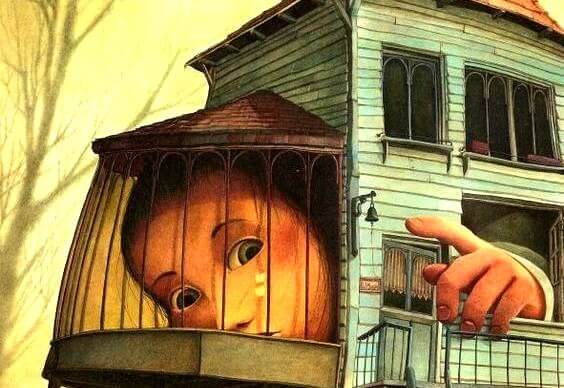The Best Rewards for Children Are Recognition and Affection

Raising a child isn’t an easy task. In fact, it’s a journey full of continuous challenges, discoveries, rewards, and punishments. Maybe you’re not a mother or a father, but you’ve probably had the opportunity to spend some time with children. How clever they are, exploring every possible thing they can with you! They’ve never been to college, nor do they have any business experience, but they’re often clear about what they want and are able to combine all their energies to that end. They’re simple, yet effective.
They follow a dizzying path of learning where they don’t stop experimenting. They fall and get back up again. They try one way, and if it doesn’t work, they try another. In these attempts, they often carry out behaviors that must be corrected, which is why raising a child requires intelligence and finesse. After a long day at work and attending to other obligations, you’re certainly not going to gain any more energy. So there’s no other option than to be smart about it.
Teaching children with punishment
Punishments are a part of traditional child-rearing, and there are many different variants we could talk about. The most immediate and socially acceptable ones, up until not too long ago, were slapping them, spanking them, or whipping them with a belt. In doing so, parents wanted their children to remember the behavior they had done and the pain associated with it.

Another form of punishment is taking away one of the child’s privileges after a bad behavior. Something that they like, whether it’s watching TV, going to the park, their favorite food, or one of their favorite toys.
Although there are more, the last form of punishment we’ll talk about is making the child do something they don’t like, such as cleaning their room, studying more, or spending more time on a certain activity that they would normally erase from their routine.
We began this article saying that it isn’t easy to raise a child. Well, punishing them in the right way and at the right time requires more intelligence than immediately slapping them. A good punishment is announced as a consequence of an action, proportional to the infraction, applied immediately and consistently by the people responsible for the child, and is an effective compensation for the possible damage that’s been caused.
Even so, punishment presents two big problems. The first is that the authority figure must demand the punishment and make sure it is fulfilled. That is, you run the risk of the child doing some action that you consider “punishable,” and you not finding out about it. Therefore, you don’t apply the punishment and the child learns to sneak around, not abandon the behavior.
The second problem is that punishments don’t really teach too much. They point out what is bad, but they don’t say what behavior should substitute for the one that’s being corrected, which means it might be substituted with an even less adaptive behavior. Imagine that you punish a child for insulting someone in order to get attention. If you punish them, they might substitute this behavior with hitting, and then you wouldn’t have achieved anything.
Teaching children with rewards
What do rewards and recognition bring? Happiness! What a truly beautiful emotion. If only for that, we should teach our children with rewards and recognition. A little while ago, I read an article that talked about the power of a green pen. The article denounced something that teachers do systematically, but it can also be related to parenting, even though parents don’t correct exams. It talked about the abuse of the red pen (corrections) and the underuse of the green pen (praise).
Using a green pen means pointing out things they’ve done well. It means recognizing, encouraging, and motivating the child to repeat this behavior or to continue in that direction. How hard would it be to correct with a green pen?
The green pen has a magical power over the frame of mind of the person who educates with ink. The world is full of parents who focus on failures, and who don’t bother with praise because they consider these behaviors to be normal. They don’t realize that when their approval makes these behaviors extraordinary, it reinforces them.
In fact, we often start to correct our children because they’re bothering us. Don’t be noisy, don’t slurp, don’t jump on the bed, don’t get dirty or I’ll have to clean you up later. Whatever it is, the message in the background is clear: don’t bother me, child. In our insistence on calm, we even punish exuberant happiness.

However, when the child is reading, playing quietly with clay, or watching an approved TV show attentively, we don’t say anything. Our way of telling them that their behavior is good is the absence of correction. Sad, isn’t it?
We’re not talking about buying them a toy or letting them stay in the park for five extra minutes, we’re talking about the best prize in the world for a child: their parents telling them that they did something well, coming up and giving them a hug, or reading or playing with them. Is there a better gift for a child than that?
Raising a child isn’t an easy task. In fact, it’s a journey full of continuous challenges, discoveries, rewards, and punishments. Maybe you’re not a mother or a father, but you’ve probably had the opportunity to spend some time with children. How clever they are, exploring every possible thing they can with you! They’ve never been to college, nor do they have any business experience, but they’re often clear about what they want and are able to combine all their energies to that end. They’re simple, yet effective.
They follow a dizzying path of learning where they don’t stop experimenting. They fall and get back up again. They try one way, and if it doesn’t work, they try another. In these attempts, they often carry out behaviors that must be corrected, which is why raising a child requires intelligence and finesse. After a long day at work and attending to other obligations, you’re certainly not going to gain any more energy. So there’s no other option than to be smart about it.
Teaching children with punishment
Punishments are a part of traditional child-rearing, and there are many different variants we could talk about. The most immediate and socially acceptable ones, up until not too long ago, were slapping them, spanking them, or whipping them with a belt. In doing so, parents wanted their children to remember the behavior they had done and the pain associated with it.

Another form of punishment is taking away one of the child’s privileges after a bad behavior. Something that they like, whether it’s watching TV, going to the park, their favorite food, or one of their favorite toys.
Although there are more, the last form of punishment we’ll talk about is making the child do something they don’t like, such as cleaning their room, studying more, or spending more time on a certain activity that they would normally erase from their routine.
We began this article saying that it isn’t easy to raise a child. Well, punishing them in the right way and at the right time requires more intelligence than immediately slapping them. A good punishment is announced as a consequence of an action, proportional to the infraction, applied immediately and consistently by the people responsible for the child, and is an effective compensation for the possible damage that’s been caused.
Even so, punishment presents two big problems. The first is that the authority figure must demand the punishment and make sure it is fulfilled. That is, you run the risk of the child doing some action that you consider “punishable,” and you not finding out about it. Therefore, you don’t apply the punishment and the child learns to sneak around, not abandon the behavior.
The second problem is that punishments don’t really teach too much. They point out what is bad, but they don’t say what behavior should substitute for the one that’s being corrected, which means it might be substituted with an even less adaptive behavior. Imagine that you punish a child for insulting someone in order to get attention. If you punish them, they might substitute this behavior with hitting, and then you wouldn’t have achieved anything.
Teaching children with rewards
What do rewards and recognition bring? Happiness! What a truly beautiful emotion. If only for that, we should teach our children with rewards and recognition. A little while ago, I read an article that talked about the power of a green pen. The article denounced something that teachers do systematically, but it can also be related to parenting, even though parents don’t correct exams. It talked about the abuse of the red pen (corrections) and the underuse of the green pen (praise).
Using a green pen means pointing out things they’ve done well. It means recognizing, encouraging, and motivating the child to repeat this behavior or to continue in that direction. How hard would it be to correct with a green pen?
The green pen has a magical power over the frame of mind of the person who educates with ink. The world is full of parents who focus on failures, and who don’t bother with praise because they consider these behaviors to be normal. They don’t realize that when their approval makes these behaviors extraordinary, it reinforces them.
In fact, we often start to correct our children because they’re bothering us. Don’t be noisy, don’t slurp, don’t jump on the bed, don’t get dirty or I’ll have to clean you up later. Whatever it is, the message in the background is clear: don’t bother me, child. In our insistence on calm, we even punish exuberant happiness.

However, when the child is reading, playing quietly with clay, or watching an approved TV show attentively, we don’t say anything. Our way of telling them that their behavior is good is the absence of correction. Sad, isn’t it?
We’re not talking about buying them a toy or letting them stay in the park for five extra minutes, we’re talking about the best prize in the world for a child: their parents telling them that they did something well, coming up and giving them a hug, or reading or playing with them. Is there a better gift for a child than that?
This text is provided for informational purposes only and does not replace consultation with a professional. If in doubt, consult your specialist.







